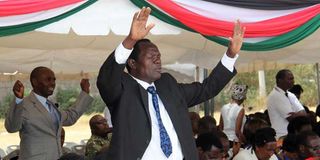NATION AGENDA: Region keeps an eye on Kenya’s election

Church leaders pray for peaceful elections at Nakuru’s Afraha Stadium on February 4, 2017. Kenya’s election will be closely watched by the region, as a stress-test of the country’s democratic credentials. PHOTO | SULEIMAN MBATIAH | NATION MEDIA GROUP
Kenya’s election will be closely watched by the region, as a stress-test of the country’s democratic credentials and for its potential spill-over effects.
Many will be looking to see if it mirrors 2007, which was marred by violence, or 2013 in which the country settled for an imperfect peace at the expense of a perfect process.
Uganda, Rwanda, Burundi, South Sudan and eastern DR Congo depend on the northern transport corridor and will be apprehensive about a repeat of 2007/8 when mobs torched trucks and uprooted sections of the railway.
The economic ties run both ways.
Kenya is the biggest investor in Uganda, but the western neighbour is a key source of food and tourists.
Kenya’s race against Tanzania to become the preferred transport link to the Indian Ocean for railway lines, pipelines and other infrastructure will be strengthened by its ability to hold a peaceful election.
There are political reasons for the region too.
As integration grows, so do personal ties between actors.
WARM TIES
For instance, opposition leader Raila Odinga is known to enjoy warm ties with President John Magufuli of Tanzania, while President Uhuru Kenyatta is close to Uganda’s Yoweri Museveni.
Any breakdown of security or certain outcomes are likely to test these ties as well as the environment for cooperation, as Mr Tom Juma of Moi University noted in a November 2015 study of the 2007 poll.
To this, add the factionalism in South Sudan — a contest in which Kenya has been publicly accused of picking sides — and Burundi, where officials blame Nairobi for siding with Kigali in its contest with Rwanda.
Beyond the self-interest, however, the election will offer at least two important lessons.
The first is whether the progress seen between the last two elections is evidence of deepening democracy.
FACTORS THAT PREVENTED VIOLENCE
In a study of the 2013 election published in the Journal of East African Studies, Nic Cheeseman, Gabrielle Lynch and Justin Willis highlighted four factors that prevented a return to violence — rivals becoming allies, a pervasive peace narrative, democratic reforms and decentralisation that gave national losers some electoral wins at county level.
“Although the elections passed off largely peacefully, they did not confirm a process of democratic consolidation or herald the end of inter-ethnic tension,” said the authors.
The reality in 2017 has changed in some aspects. For instance the “siege mentality” offered by the International Criminal Court charges against Mr Kenyatta and Mr Ruto is unlikely to be a factor.
Similarly, while civil disobedience was almost an anathema in 2013, it has been a hallmark of mobilisation over the hiring of a team in charge of organising the elections and has been followed by strikes by teachers and health workers.
A key test will be the integrity of the electoral system, particularly voter registration, vote counting, tallying and transmission of results.
An opinion poll in May 2013 found that 56 per cent of respondents believed the election that year had been free and fair — with lower figures in opposition strongholds.
This relatively low level of confidence in the polls was nevertheless helped by Mr Odinga’s acceptance of the Supreme Court ruling on the presidential election petition.
FLASHPOINT
There have been early reports of problems, including the use of IDs for multiple registration, which could become a flashpoint if there are challenges with the voting and tallying infrastructure on election day.
Beyond the nuts and bolts of how the process is conducted and the outcome received, Kenya’s election offers a chance to examine the East African Community’s democratic credentials. Unfortunately, they do not make for pretty reading.
South Sudan has been embroiled in civil war since December 2013, is nearly bankrupt, and on the verge of becoming a failed state.
Burundi has been in the grip of a crisis since President Pierre Nkurunziza insisted on running for another term of office at the end of his terms.
Rwanda changed its constitution to allow President Paul Kagame to stand again while President Museveni faces questions about legitimacy after another contested election.
Tanzania has its challenges with corruption and Zanzibar politics remains restive but it has been the most stable country in the region.
Since the departure of Mwalimu Julius Nyerere, it has seen peaceful handover of power from one elected leader to another three times.


